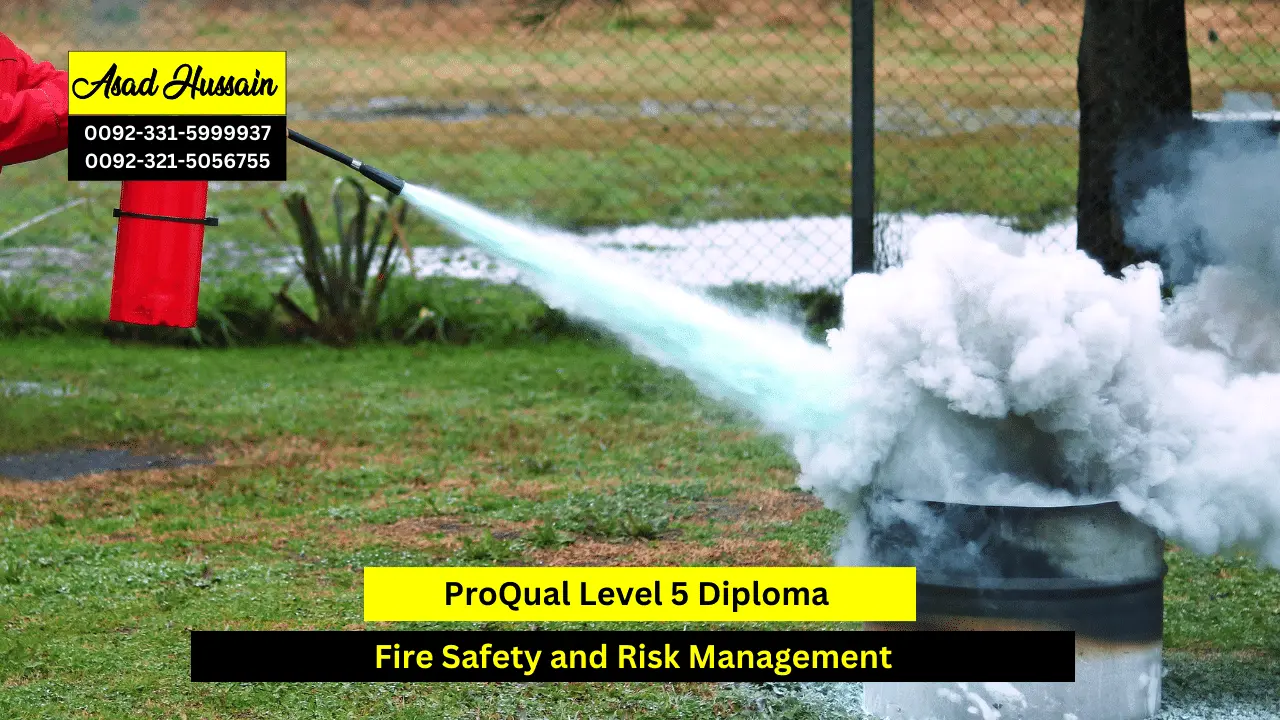The ProQual Level 5 Diploma in Fire Safety and Risk Management is a qualification that is designed for individuals who work in or aspire to work in fire safety and risk management roles. This diploma provides learners with the knowledge and skills necessary to effectively manage fire safety in a range of settings, including workplaces, public buildings, and residential properties.
The course covers a range of topics, including the principles of fire safety, the legal and regulatory framework for fire safety, fire risk assessment, fire prevention and protection, emergency planning and management, and the management of fire safety in specific settings.
The ProQual Level 5 Diploma in Fire Safety and Risk Management is a recognized qualification in the UK and is accredited by ProQual, an awarding organization regulated by Ofqual. Upon completion of the diploma, learners will have the knowledge and skills necessary to manage fire safety and risk in a range of settings and will be able to progress into a range of fire safety and risk management roles
we are offering ProQual Qualifications in Association with ICTQual ( Inspire College of Technologies Uk).
Program Highlights
The “ProQual Level 5 Diploma in Fire Safety and Risk Management” is a comprehensive qualification designed to equip individuals with the knowledge, skills, and understanding required to effectively manage fire safety and minimize risks within various settings. The qualification structure consists of several units, each focusing on specific aspects of fire safety and risk management.•
Mandatory Units
The entry requirements for the “ProQual Level 5 Diploma in Fire Safety and Risk Management” typically include:
- Educational Qualifications: Candidates should possess a relevant Level 4 qualification or equivalent in a related subject. This could be a diploma or a degree in fire safety, health and safety, emergency management, or a closely related field.
- Work Experience: Applicants are usually required to have relevant work experience in a fire safety or risk management role. This experience could vary, but a typical requirement might be a minimum of two to three years of experience in a relevant field.
- English Language Proficiency: Since the course is conducted in English, a good command of the English language is essential. Applicants may need to provide evidence of their English language proficiency through tests like IELTS, TOEFL, or other recognized language assessments if English is not their first language.
- Age Requirement: There is usually no specific age requirement for entry, but applicants should be at least 18 years old.
It’s important to note that entry requirements can vary between different institutions and training providers offering the course. Prospective students should always check with the specific institution offering the “ProQual Level 5 Diploma in Fire Safety and Risk Management” to confirm the exact entry requirements for that particular course.
Join us on this path of transformative growth and take the first step towards becoming a strategic leader in health and safety. Your dedication and commitment can unlock a world of opportunities and impact.
Upon completing the “ProQual Level 5 Diploma in Fire Safety and Risk Management,” participants will have achieved the following learning outcomes:
- Comprehensive Understanding of Fire Safety Regulations: Students will demonstrate an in-depth knowledge of relevant local and national fire safety regulations, codes, and standards, including their application in various settings.
- Risk Assessment and Hazard Identification: Learners will be proficient in conducting thorough fire risk assessments, identifying potential hazards, and evaluating their impact on safety within diverse environments.
- Effective Emergency Planning: Students will be capable of developing and implementing efficient emergency plans, ensuring the safe evacuation of occupants and the coordinated response of emergency services.
- Fire Prevention Strategies: Participants will be skilled in designing and implementing proactive fire prevention strategies, including the proper selection and maintenance of fire safety equipment, to minimize fire risks.
- Building Design and Fire Safety: Learners will comprehend the principles of building design in relation to fire safety, enabling them to assess structures for compliance and recommend improvements.
- Communication and Training: Students will exhibit effective communication skills necessary for conveying fire safety information to various stakeholders, as well as for conducting fire safety training sessions.
- Legal and Regulatory Compliance: Participants will demonstrate a clear understanding of legal obligations related to fire safety, enabling them to ensure compliance and avoid legal issues.
- Fire Investigation Techniques: Learners will acquire knowledge of fire investigation techniques, allowing them to contribute to post-incident analyses and recommend measures to prevent future occurrences.
- Management of Fire Safety Systems: Students will be proficient in overseeing fire safety systems, such as alarms, sprinklers, and suppression systems, ensuring their proper functioning and maintenance.
- Leadership in Fire Safety: Participants will develop leadership skills necessary to manage fire safety teams, coordinate efforts, and promote a culture of safety within organizations.
- Analytical Problem Solving: Learners will be able to critically analyze complex fire safety scenarios, evaluate potential risks, and propose effective solutions that prioritize life safety.
- Ethical Considerations: Students will understand the ethical responsibilities associated with fire safety and risk management, demonstrating a commitment to upholding safety standards and protecting lives.
- Project Management: Participants will acquire fundamental project management skills, enabling them to plan, execute, and monitor fire safety projects efficiently.
- Effective Documentation and Reporting: Learners will be adept at producing accurate and detailed reports, documenting fire safety assessments, incidents, and recommendations.
- Continuous Improvement: Students will be prepared to engage in continuous professional development, staying updated with industry advancements and best practices in fire safety and risk management.
By achieving these learning outcomes, participants in the “ProQual Level 5 Diploma in Fire Safety and Risk Management” will be well-equipped to excel in roles related to fire safety, risk assessment, emergency planning, and overall safety management across a range of industries.
The “ProQual Level 5 Diploma in Fire Safety and Risk Management” course is designed for individuals who are looking to enhance their knowledge and skills in the field of fire safety and risk management. This course is particularly suited for:
- Fire Safety Professionals: Those already working or aspiring to work in fire safety, whether in public or private sectors, including fire safety officers, inspectors, consultants, and managers.
- Health and Safety Practitioners: Professionals responsible for ensuring the safety and wellbeing of individuals within various settings, such as workplaces, residential buildings, and public spaces.
- Facility Managers: Individuals managing properties, facilities, or estates where fire safety and risk management are critical aspects of their responsibilities.
- Construction and Building Industry Professionals: Architects, engineers, and project managers seeking a comprehensive understanding of integrating fire safety measures into design and construction.
- Emergency Response Personnel: Firefighters, emergency responders, and those involved in disaster management who wish to deepen their understanding of fire behavior and safety protocols.
- Regulatory and Compliance Officers: Professionals responsible for ensuring organizations adhere to fire safety regulations and industry standards.
- Risk Management Specialists: Individuals focused on identifying, assessing, and mitigating risks within organizations, with a specific interest in fire-related risks.
- Safety Committee Members: Individuals who are part of safety committees in various organizations and want to contribute more effectively to fire safety discussions and decisions.
- Consultants and Advisers: Those who provide expert advice and consultation on fire safety to businesses, institutions, and government agencies.
- Anyone Seeking Career Progression: Individuals who recognize the importance of fire safety and risk management knowledge in their respective fields and wish to advance their careers.
Overall, this course is designed to cater to a diverse range of professionals who require a deep understanding of fire safety principles, regulations, and best practices to effectively manage and mitigate fire-related risks in various settings.






